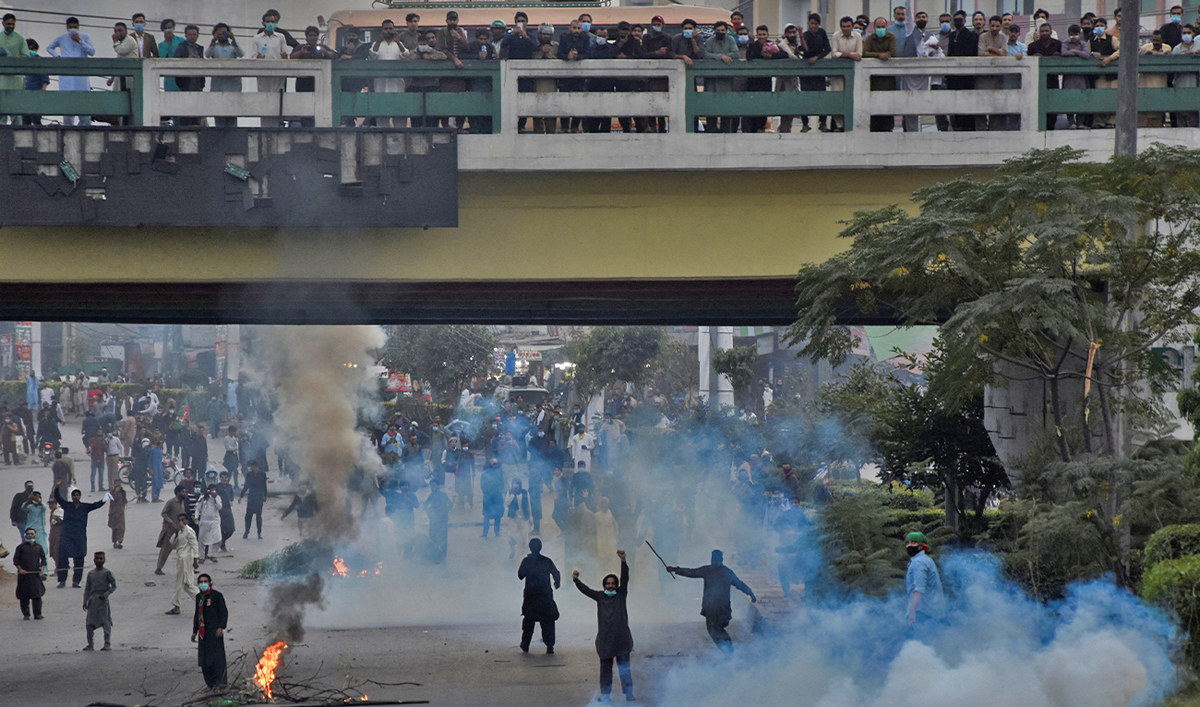DUBAI: The Pakistani information minister on Sunday accused former Prime Minister Imran Khan of inciting violence through his call for daily nationwide protests, saying he was welcome to call an international body to aid investigations into a gun attack in which he was injured this week.
Khan was shot in the legs on Thursday as he waved to crowds from atop a truck-mounted container while leading a dayslong protest march to Islamabad from Lahore to pressure the government to announce early elections.
The leader of the Pakistan Tehreek-e-Insaf party was removed from office in a parliamentary vote of no-confidence in April, and has since frequently said his ouster was part of a US-backed “foreign conspiracy.” Washington and Khan’s opponents, including Prime Minister Shehbaz Sharif who heads the coalition government, deny the claim.
In a press talk from hospital on Friday, his legs bandaged and propped up on a chair, Khan said he would relaunch his protest march to the capital. Just hours before the former leader spoke, his supporters staged national wide demonstrations, blocking major roads and clashing with police.
Khan also called on supporters to mobilize daily to protest the “assassination” attempt against him and demand the resignation of the sitting PM.

People react as police use tear gas to disperse them during a protest to condemn the shooting incident on a long march held by Pakistan's former Prime Minister Imran Khan in Wazirabad, in Rawalpindi, Pakistan, on November 4, 2022. (REUTERS)
In a phone interview with Arab News, Pakistan’s Information Minister Marriyum Aurangzeb said Khan wanted “chaos in the country.”
“Mr. Khan is inciting violence in Pakistan and instigating hate in Pakistan,” she said.
Since Thursday’s attack, Khan has held three officials responsible: Prime Minister Shehbaz Sharif, Interior Minister Rana Sanaullah and Inter-Services Intelligence director-general for counter-intelligence Maj. Gen. Faisal Naseer. Khan has also called for all three to step down, saying a transparent probe was impossible while they remained in office.
The ex-premier has not provided evidence to support his accusations. Both the government and the military have said the accusations are baseless.
“It’s absurd, it’s ridiculous to the max … How is the prime minister connected to this incident?” the information minister said, adding that Khan could call an international agency to come to Pakistan and be involved in the probe if he wanted to.
As the attack took place in Pakistan’s Punjab province, which is ruled by Khan’s Pakistan Tehreek-e-Insaf party, Aurangzeb said the former PM had everything at his disposal — the administration, police and intelligence — to conduct a probe but so far has not even filed a first information report, or FIR, which is the first step in Pakistan’s legal system before an investigation into a case.
“It is a fact that it has been 48 hours since the incident and the FIR report has not been registered in any police station in Punjab,” she said.
Aurangzeb reiterated that the Sharif government immediately called for a probe after the attack.
“The moment this incident happened, the prime minister of Pakistan called the interior minister and immediately asked for an initial report from the chief secretary of Punjab and the IG (Inspector General) Punjab,” Aurangzeb said. “And the interior minister was instructed to give all recourses, all assistance to the Punjab government for any investigation they want, for any security they want.”
“And the interior minister was instructed to give all recourses, all assistance to the Punjab government, for any investigation they want, for any security they want.”
















